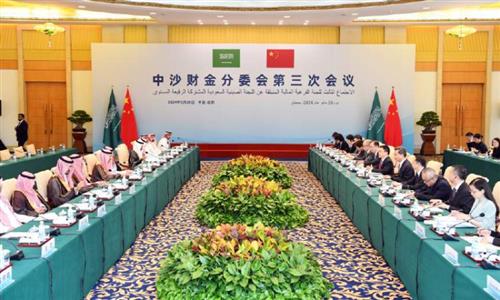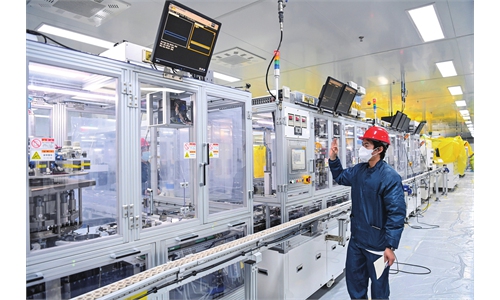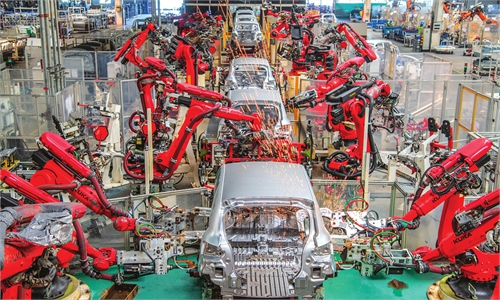Xiconomics in Practice: China aims to nurture more world-class companies, bolster sci-tech innovation

A view of the Lujiazui area in Shanghai Photo: VCG
China aims to nurture more world-class companies by improving the modern corporate system, build an internationalized scientific research environment, and improve scientific and technological (sci-tech) security mechanisms and mechanisms guarding against risks, according to a top meeting held on Tuesday.While presiding over the fifth meeting of the central commission for deepening overall reform of the 20th Communist Party of China (CPC) Central Committee, Chinese President Xi Jinping stressed efforts to improve the modern corporate system with Chinese characteristics and foster a globally competitive open environment for scientific and technological innovation, the Xinhua News Agency reported.
The focus of the top meeting underscores China's intensifying efforts to build a high-level socialist market economy system, improve China's global competitiveness in the economic, technological and other fields, and bolster its capabilities to guard against major risks, amid an increasingly complex external environment marked by rising protectionism and blockades, Chinese experts said on Wednesday.
The meeting deliberated and approved guidelines on optimizing the modern corporate system with Chinese characteristics, safeguarding grain-growing farmers' incomes and improving compensation mechanisms in major grain-producing areas, and building a globally competitive open environment for scientific and technological innovation, according to Xinhua.
Xi, also general secretary of the CPC Central Committee and chairman of the Central Military Commission, stressed the need to strengthen the leadership of the CPC, improve corporate governance, and promote enterprises to establish a modern corporate system with clearly defined responsibilities and effective management to nurture more world-class companies.
It is also imperative to catalyze innovation through openness, Xi said, calling for opening-up in the technology sector, building a globally oriented innovation system, and actively participating in global innovation, according to Xinhua.
The meeting stressed the importance of expanding global scientific and technological exchange to forge a cooperative, win-win partnership, as well as building an internationalized scientific research environment that attracts, retains and gives full play to talent. It also called for improving sci-tech security mechanisms and mechanisms guarding against risks.
"Technological innovation and industrial revolution play an increasingly important role in national economic competitiveness and comprehensive competitiveness. Whether a country can seize the historical opportunities of scientific and technological innovation and industrial revolution, in a sense, determines the future and destiny of a country," said Zhi Zhenfeng, a research fellow with the Institute of Law at the Chinese Academy of Social Sciences.
Zhi told the Global Times China is stepping up efforts to build a better and more open environment that is more conducive to scientific and technological innovation. "As China today faces extreme crackdowns and blockade by certain countries, we still need to promote high-level opening-up," he said, noting the guidelines approved on Tuesday will lay the groundwork for China to build a global sci-tech innovation system that promotes win-win cooperation.
In an ill attempt to contain China's rise, the US and some of its allies have been imposing restrictions and blockades against China in various high-tech fields, including semiconductors. They have also imposed or plan to impose restrictions on China's exports of highly competitive products such as electric vehicles and solar panels. In addition to Chinese products, the US has also deployed state power to crack down on Chinese companies, both state-owned enterprises and private firms that have gained global prominence.
Against such a background, it is increasingly imperative to improve Chinese companies' corporate system so as to bolster their ability to tackle risks, experts noted.
The meeting on Tuesday concluded that to improve the modern corporate system, it is essential to respect enterprises as key players in business activities, improve modern corporate governance in state-owned enterprises, and strengthen the supervision and management of state-owned capital. It also noted that eligible private enterprises should be encouraged to build modern corporate systems.
"For both state-owned enterprises and private businesses, it is important to build modern corporate systems, take advantage of both the domestic and overseas markets, and strive for developments in areas where China currently faces challenges," Su Wei, a professor from the Party School of the CPC Chongqing Municipal Committee, told the Global Times on Wednesday.
Su also said reform of state-owned enterprises remains one of the top priorities in China's overall reform and building modern corporate systems at state-owned enterprises is critical, both private and foreign businesses should also focus on building modern corporate systems that are in line with China's plan to build a high-level socialist market economy.
The meeting comes as China moves swiftly to build a high-level socialist market economy, as part of its overall reform agenda. While chairing a symposium in Jinan, East China's Shandong Province, on May 23, which was attended by representatives from businesses and academia, Xi stressed the need to deepen reform further across the board with efforts centering on advancing Chinese modernization. China should adhere to and develop its basic economic system and work to build a high-level socialist market economy system, Xi said.
Moreover, the 20th CPC Central Committee will hold its all-important third plenary session in July, when issues concerning further comprehensively deepening reform and advancing Chinese modernization will be studied, according to a Political Bureau meeting on April 30.
Su said the upcoming third plenary session will yield new theoretical innovations and progress in comprehensively and systematically improving the socialist market economic system.
Reform and opening-up is an effective instrument for the Party and the people to make great strides in keeping up with the times in pursuing their cause, according to the CPC Central Committee Political Bureau meeting in April. China's reform must continue in the face of complex international and domestic situations, a new round of scientific and technological revolution and industrial changes, and the new anticipation of the people, the meeting said.
Amid the increasingly complex global geo-economic situation and new sci-tech trends and industrial revolution, China's top priority is to bolster its competitiveness and capabilities to guard against risks through continuous reform and opening-up, experts said.
Judging from all the important meetings and documents, "promoting Chinese modernization through comprehensively deepening reforms is an important task crucial for a period of time," Zhi said.




